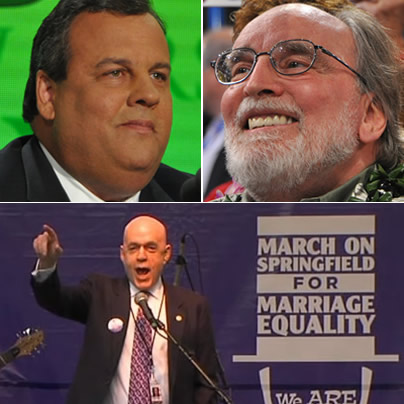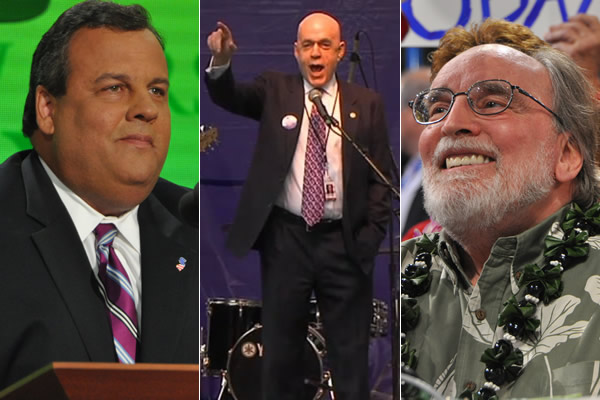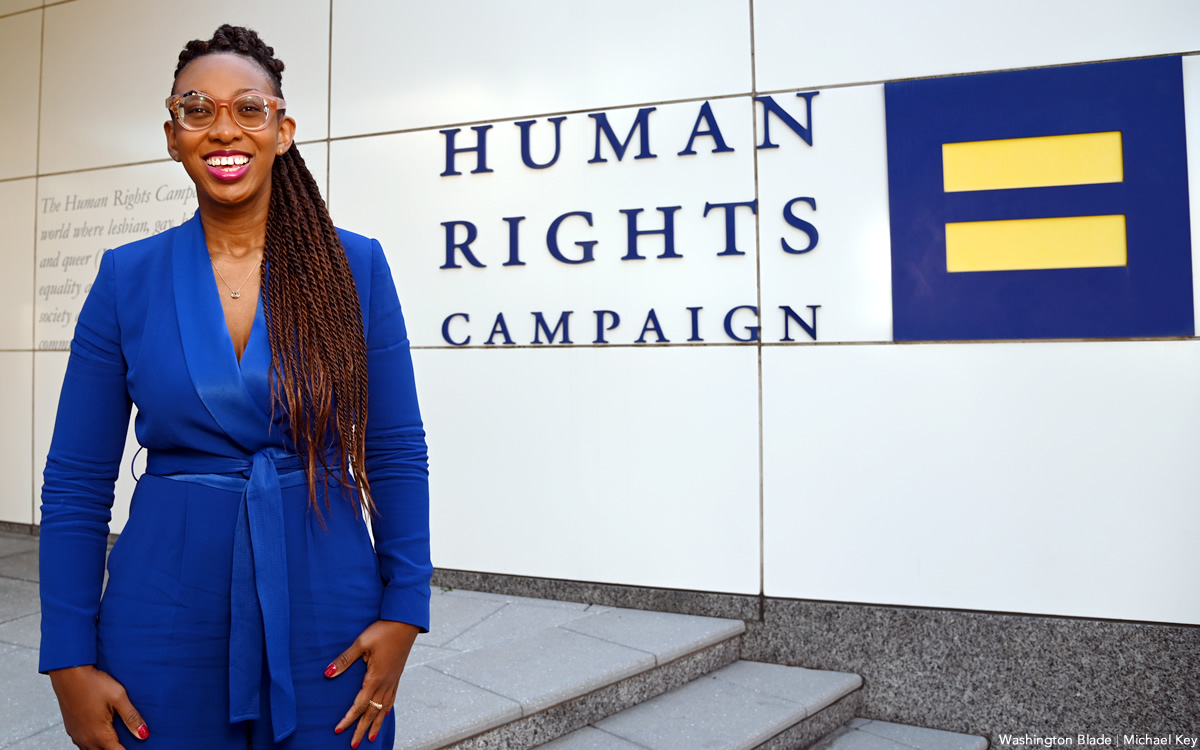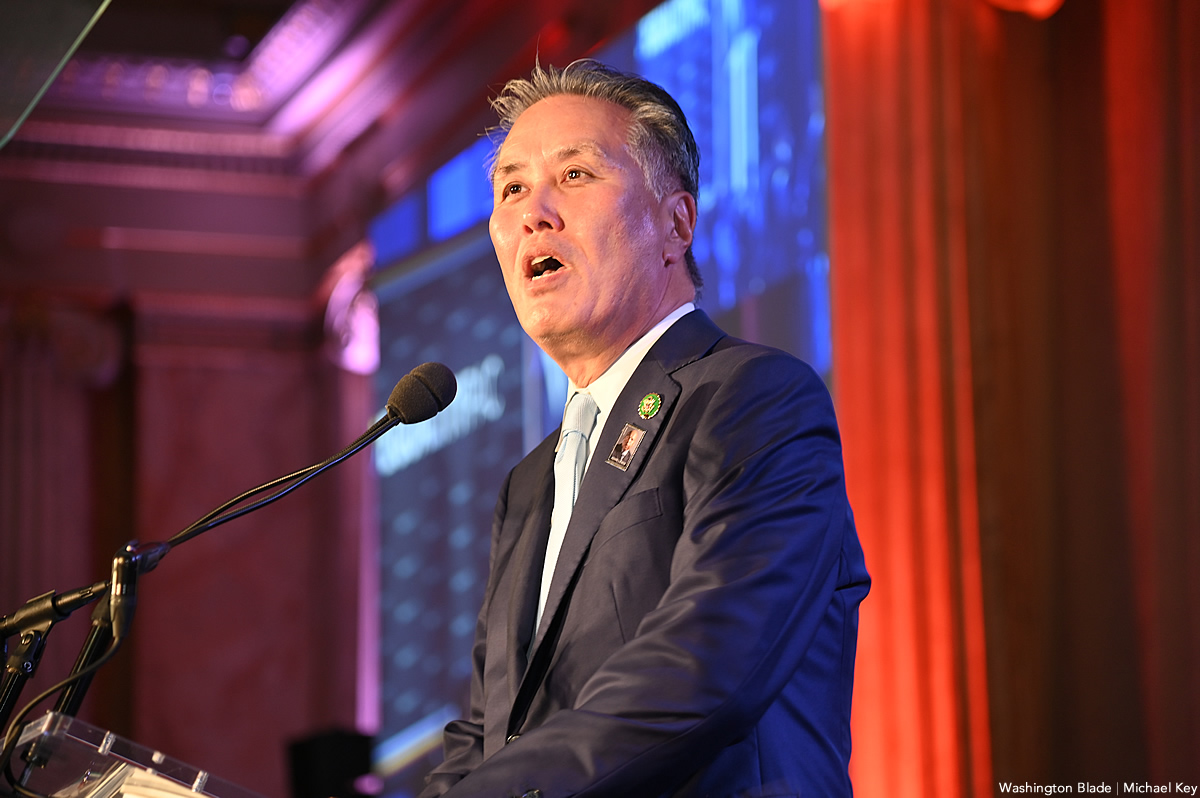Politics
Another ‘marriage moment’ before year’s end?
Action underway in New Mexico, Illinois and Hawaii


Marriage equality has come to New Jersey under Gov. Chris Christie as Illinois state Rep. Greg Harris and Hawaii Gov. Neil Abercrombie seek passage of legislation. (Washington Blade photos of Christie and Abercrombie by Michael Key; photo of Greg Harris via Livestream).
The month of October 2013 could go down in history as a milestone in the marriage equality movement.
In addition to New Jersey becoming the 14th state in the country to make same-sex marriage legal, states across the country in recent days saw developments in the legislatures and the courts on marriage equality that could expand that roster of equality states by the end of the month.
James Esseks, director of the LGBT project for the American Civil Liberties Union, predicted during a conference call with reporters last week the activity on same-sex marriage this month could create another “marriage moment.”
“I think we are approaching another marriage moment this fall with potential developments in three to four states coming soon,” Esseks said.
The action on marriage comes on the heels of the filing of new litigation both in federal and state courts as well as new legislative efforts seeking marriage equality initiated after the Supreme Court ruled on the Defense of Marriage Act and California’s Proposition 8 in June.
Dan Pinello, a political scientist at the City University of New York, said the activity on marriage equality at this time is in part the result of the Supreme Court’s actions.
“The high court’s decision unleashed a floodgate of pent-up demand in the LGBT community that is finding true expression in a tidal wave of federal litigation,” Pinello said. “The ruling also prompted an increased awareness of newly recognized constitutional rights among federal judges in the lower courts. The outcomes of all this legal activity will emerge over the next several years.”
The Washington Blade has already provided coverage of developments on marriage equality in New Jersey and Michigan. Here are details on other states in recent weeks.
New Mexico
The New Mexico Supreme Court heard oral arguments on Wednesday in a case brought by all 33 New Mexico clerks, state district courts and a group of same-sex couples seeking a determination on whether state law permits same-sex marriage.
The arguments in the case, Griego v. Oliver, were divided into two portions. The first examined whether the current statutory scheme for marriage under New Mexico law already allows same-sex marriage because portions of it are gender-neutral. In the second, attorneys made their case on whether same-sex couples have a guaranteed right under the state constitution to marry regardless of what the statute says.
Representing Republican lawmakers seeking to prohibit same-sex marriage in New Mexico was attorney James Campbell, who argued that only the legislature has authority to legalize marriage rights for gay couples. Campbell maintained marriage under New Mexico law is reserved for opposite-sex couples because “those unions, unlike same-sex unions, have a natural ability to procreate.”
Campbell also argued that the court shouldn’t determine gay people should be considered a suspect class because they enjoy political power. The legalization of same-sex marriage through state legislatures as well as the Democratic Party and President Obama’s endorsement of same-sex marriage, Campbell said, is evidence of this political power.
Representing the views in court of District Judge Alan Mallot, who had previously ruled that same-sex couples can marry because of the gender-neutral language in the marriage law, was attorney Daniel Ivey-Soto.
Attorney General Gary King sent two attorneys to argue a more middle-ground argument. Assistant Attorney General Scott Fuqua argued that the current gender-neutral statute doesn’t permit same-sex marriage, but Assistant Attorney General Sean Cunniff maintained gay couples should be allowed to marry under the equal protection provisions under the state constitution.
Same-sex couples were represented by attorney Maureen Sanders, who articulated a similar view. She argued the gender-neutral law doesn’t allow gay couples to marry in New Mexico, but said “denying same-sex couples the right to marry is a violation of the New Mexico Constitution.”
Sanders also argued gay people should be considered a suspect class. The court shouldn’t look to the recent advancement in LGBT equality, she said, but the long history of discrimination the LGBT community has experienced.
Justices appeared skeptical of the idea of continuing to ban same-sex couples from marrying in New Mexico. In response to Campbell’s argument that marriage is for procreation, Chief Justice Charles Daniels noted many benefits related to marriage aren’t given to couples based on whether they’ve had children.
Despite hopes that the court would issue a ruling on marriage equality at the conclusion of the arguments, justices signaled as they began they would need more time. It’s unclear when a decision could come down, although it could be a matter of weeks.
Nevada
The federal marriage equality case that is closest to the Supreme Court is also seeing movement as proponents of marriage equality — following the lead of Lambda Legal, which is responsible for the lawsuit — were set to weigh in on bringing marriage equality to Nevada.
On Oct. 18, Lambda Legal filed a 100-page brief before the U.S. Ninth Circuit Court of Appeals in the case of Sevcik v. Sandoval, a lawsuit the organization filed last year. Because the case is now before an appellate court, it’s the most advanced lawsuit that’s pending before federal courts.
The opening brief makes use of the U.S. Supreme Court decision against the Defense of Marriage Act by arguing that Nevada’s ban on same-sex marriage deprives gay couples of the crucial benefits just as the anti-gay federal law had done.
“By foreclosing same-sex couples from marriage, Nevada inflicts virtually the same collection of federal harms and deprivations on unmarried same-sex couples as DOMA previously did, since nearly all federal benefits are unavailable to unmarried couples, regardless of whether they are registered domestic partners,” the brief states.
A major component of the argument that Lambda makes against the ban on same-sex marriage is the state’s domestic partnership system is inadequate for gay couples even though it provides them the legal equivalent of marriage.
“Relegating same-sex couples to registered domestic partnership is no remedy,” the brief states. “That novel, inferior status qualifies unmarried same-sex couples for virtually no federal benefits, and instead designates same-sex couples as second-class citizens and subjects them to a host of practical difficulties and vulnerabilities.”
Accompanying the opening brief is a motion to the court for permission to file another brief no longer than 26,500 words for “an adequate exposition of the plaintiff couple’s claims.”
Friend-of-the-court briefs in favor of marriage equality were also due in the case on Wednesday. That marks the opportunity for the Obama administration to weigh in on the lawsuit by filing its own friend-of-the-court brief in the case. Lambda has previously said it would “welcome” a brief from the U.S. Justice Department in the case, but as of Tuesday had no information on whether one would be forthcoming.
Illinois
All eyes will be on the Illinois Legislature in the coming days as lawmakers return for a “veto session” that will likely include a vote in the State House on marriage equality.
On Tuesday, the first day of the veto session, supporters held a “March on Springfield” to urge passage of the marriage equality legislation. Speakers at a rally held near the State Capitol Building included Gov. Pat Quinn and U.S. Sen. Richard Durbin (D-Ill.).
According to Buzzfeed, Durbin invoked the Supreme Court decision against DOMA while speaking before the estimated 2,300 attendees about passing marriage equality legislation.
“Now that the Supreme Court has ruled, I say to members of the Illinois House of Representatives, you have an awesome and historic decision,” Durbin said. “Will you offer to everyone married in our state — regardless if straight, gay, lesbian, whatever — will you offer them the same federal benefits, or will you discriminate against some.”
The regular session of the legislature concluded in May, to the dismay of supporters of same-sex marriage, without a vote on same-sex marriage legislation in the House that was earlier passed in the Senate. Gay State Rep. Greg Harris declined to bring the legislation to a vote because he believed it lacked sufficient support for passage.
Bernard Cherkasov, CEO of Equality Illinois, expressed confidence that lawmakers would act during the veto session to pass the legislation based on recent polling data from Fako & Associates in Lisle, IL, showing a 12-point margin in support of marriage equality.
“Amongst key constituencies like African Americans, there’s a 20-point spread, amongst Latino voters, there’s a 30-point spread, amongst American Catholics, there’s a 30-point spread,” Cherkasov said. “There’s strong business support. Illinoians expect lawmakers will do their job and the pass the bill.”
Because the legislature in is in a veto session, different rules apply to passing legislation. A bill that would go into effect immediately, as the Senate-passed marriage equality legislation does, would require a supermajority of 71 votes in the House for passage. But bills that go into effect at a later date need only a simple majority of 60 votes for passage. The veto session consisted of two days this week, followed by a break, and another three days when lawmakers return on Nov. 5.
Cherkasov said the bill is “definitely within striking distance” in the House for votes to passage under the lower 60-vote threshold, which he said could be arranged by amending the House bill to go into effect on June 1 and passing that bill in the Senate.
Asked whether he wants the bill to come up for a vote during the veto session regardless of whether supporters think it has the necessary votes, Cherkasov said, “I do believe that if it came to the floor that it would pass.”
Advocates are pursuing same-sex marriage legislation in Illinois as a state lawsuit seeking marriage equality in the state, Darby v. Orr, is pending in Cook County Circuit Court.
Hawaii
Efforts to pass same-sex marriage legislation are also underway in Hawaii, where Gov. Neil Abercrombie has called for a special session of the legislature starting Oct. 28 for the purpose of debate and passage of marriage equality.
Donald Bentz, executive director of Equality Hawaii, said he’s “optimistic” the session will lead to marriage equality in the Aloha State because of stories of “love and commitment” heard by legislators.
“Polls indicate that the majority of Hawaii’s residents support marriage equality and are buoyed by the growing list of business, faith, political and nonprofit leaders who are standing up in support of the freedom to marry,” Bentz said.
Depending upon the length of time the legislature chooses to debate the marriage bill, the special session could go as quickly as five working days or take two full weeks.
Bentz said the marriage equality legislation enjoys “a wide margin” of support in the Senate, but not so much in House. A vote tally conducted by the Honolulu Civil Beat last month found that 26 House members support the legislation. Passage of the bill in that chamber requires 27 votes.
Since the time that article was published, Bentz said State Rep. Karen Awana has gone on record as a “no” vote, but State Rep. Mark Takai has come out as a “yes” vote. That would give the bill the 27 votes necessary for passage.
Advocates are pursuing same-sex marriage legislation in Hawaii as litigation seeking marriage equality in the state, Jackson v. Abercrombie, is pending alongside the Nevada lawsuit in the Ninth Circuit.
Tennessee
The most recent lawsuit seeking marriage equality in the federal court system was filed on Tuesday by the National Center for Lesbian Rights on behalf of four legally married same-sex couples seeking recognition of their unions.
The lawsuit, known as Tanco v. Haslam, was filed by the National Center for Lesbian Rights and private attorneys Abby Rubenfeld, Maureen Holland, Regina Lambert along with the firm of Sherrard & Roe and is pending before the U.S. District Court in the Middle District of Tennessee.
Shannon Minter, NCLR’s legal director, said the lawsuit is a useful addition to other cases pending in 19 other states because it helps draw attention to the lack of LGBT rights in the South.
“We think it is important to bring cases that highlight the damage that is being caused by discriminatory state marriage bans across the country, including especially in southern states,” Minter said. “I am very hopeful we will obtain a positive result in this case, which would be hugely beneficial to LGBT people in Tennessee, and also be a huge boost to creating even more positive national momentum.”
One couple in the lawsuit, Dr. Valeria Tanco and Dr. Sophy Jesty, is expecting their first child this spring and is worried state law won’t recognize them both as legal parents. Another couple, Sgt. Ijpe DeKoe and Thom Kostura, married just before DeKoe was deployed for a tour of duty in Afghanistan.
The litigation is one of two cases seeking marriage equality in federal courts lying within the U.S. Sixth Circuit Court of Appeals. The other case is the federal litigation pending before the district court in Michigan.
Politics
HRC slams White House over position opposing gender affirming surgeries for minors
‘Biden administration is flat wrong on this’

Human Rights Campaign President Kelley Robinson issued a strong rebuke on Tuesday of the Biden-Harris administration’s position opposing gender affirming surgeries for minors.
The New York Times reported on June 28 that the White House, which broadly supports making medical interventions available for transgender youth, had expressed opposition to surgeries for patients under 18, having previously declined to take a specific position on the question.
“Health care decisions for young people belong between a patient, their family, and their health care provider. Trans youth are no exception,” Robinson responded.
“The Biden administration is flat wrong on this. It’s wrong on the science and wrong on the substance. It’s also inconsistent with other steps the administration has taken to support transgender youth. The Biden administration, and every elected official, need to leave these decisions to families, doctors and patients—where they belong,” she added. “Although transgender young people make up an extremely small percentage of youth in this country, the care they receive is based on decades of clinical research and is backed by every major medical association in the U.S. representing over 1.3 million doctors.”
Robinson said the “administration has committed to fight any ban on healthcare for transgender youth and must continue this without hesitation—the entire community is watching.”
“No parent should ever be put in the position where they and their doctor agree on one course of action, supported by the overwhelming majority of medical experts, but the government forbids it,” she added.
HRC is a prominent backer of Biden’s 2024 reelection campaign, having pledged $15 million to support efforts in six battleground states. The organization has a strong relationship with the White House, with the president and first lady headlining last year’s National Dinner.
A White House spokesperson declined to respond to Robinson’s statement.
Campaign for Southern Equality President Allison Scott also issued a statement.
“This is a cowardly statement from an administration that promised to support transgender people. It is a troubling concession to the right-wing assault on transgender Americans, falling for their false narratives about surgical care and betraying a commitment to equality and trust in the medical community,” said Scott.
“Let’s be very, very clear: Government has no business inserting itself into private medical decisions that should be exclusively between patients, their providers, and the patients’ parent or guardian,” Scott added.
“It is dangerous to begin endorsing categorical bans or limits on healthcare, and there is no justification for restricting transgender youth’s access to the very same care that many cisgender youth receive every year — that’s literally the definition of discrimination,” Scott concluded. “We demand the Biden administration retract this thoughtless statement and work to undo its damage.”
Congress
Members of Congress introduce resolution to condemn Uganda’s Anti-Homosexuality Act
U.S. Reps. Mark Takano (D-Calif.) and Joyce Beatty spearheaded condemnation

More than 20 members of Congress on Thursday introduced a resolution that condemns Uganda’s Anti-Homosexuality Act.
Gay California Congressman Mark Takano and U.S. Rep. Joyce Beatty (D-Ohio) spearheaded the resolution that U.S. Reps. Becca Balint (D-Vt.), Lloyd Doggett (D-Texas), Adriano Espaillat (D-N.Y.), Robert Garcia (D-Calif.), Sylvia Garcia (D-Texas), Josh Gottheimer (D-N.J.), Raúl Grijalva (D-Ariz.), Pramila Jayapal (D-Wash.), Hank Johnson (D-Ga.), Gwen Moore (D-Wis.), Seth Moulton (D-Mass.), Jerry Nadler (D-N.Y.), Eleanor Holmes Norton (D-D.C.), Mark Pocan (D-Wash.), Delia Ramirez (D-Ill), Linda Sánchez (D-Calif.), Jan Schakowsky (D-Ill.), Brad Sherman (D-Calif.), Rashida Tlaib (D-Mich.), Ritchie Torres (D-N.Y.), and Debbie Wasserman Schultz (D-Fla.) co-sponsored.
“The House of Representatives condemns the government of Uganda’s criminalization and draconian punishments regarding consensual same-sex sexual conduct and so-called ‘’promotion of homosexuality,’” reads the resolution.
The resolution, among other things, also calls upon the Ugandan government to repeal the law.
“It is difficult to overstate the gross inhumanity of Uganda’s Anti-Homosexuality Act,” said Takano in a press release.
President Yoweri Museveni in May 2023 signed the law, which contains a death penalty provision for “aggravated homosexuality.”
The U.S. subsequently imposed visa restrictions on Ugandan officials and removed the country from a program that allows sub-Saharan African countries to trade duty-free with the U.S. The World Bank Group also announced the suspension of new loans to Uganda.
The Ugandan Constitutional Court in April refused to “nullify the Anti-Homosexuality Act in its totality.” A group of Ugandan LGBTQ activists appealed the ruling.
“Instead of focusing on rooting out corruption or ending extrajudicial killings, the Ugandan Parliament, president, and Constitutional Court have chosen to mark LGBTQ+ Ugandans as less than human,” said Takano. “Congress must not be silent in the face of such systematic, state-sponsored discrimination.”
“To all those LGBTQ+ people and your allies in Uganda — we see you,” added the California Democrat. “We and the Biden administration will not allow this terrible violation of basic dignity to go unchallenged.”
Politics
LGBTQ issues absent from Trump-Biden debate
Advocacy groups hoped candidates would address queer topics

At their televised debate in Atlanta on June 27, President Joe Biden and former President Donald Trump traded barbs on issues from abortion and election integrity to immigration and foreign policy. The 81 and 78-year-old candidates even argued over who is a better golfer.
Absent from the discussion, however, were matters of LGBTQ rights that have animated national politics in this election cycle with the presumptive Republican nominee promising to weaponize the federal government against queer and trans Americans as the president pledges to build on his record of expanding their freedoms and protections.
CNN hosted Thursday’s debate, with the network’s anchors Dana Bash and Jake Tapper moderating. ABC News will run the second debate scheduled for September 10.
The president’s performance was widely criticized as halting and shaky, with White House reporter Peter Baker of The New York Times writing that Democratic Party leaders are calling for him to be replaced at the top of the ticket.
Also setting the tone early into the program was Trump’s repetition of the lie that Democrats are so “radical” on matters of abortion that they “will take the life of a child in the eighth month, the ninth month, and even after birth.”
Biden, meanwhile, laid the blame at his opponent’s feet for appointing three U.S. Supreme Court justices during his term in office who overturned Roe v. Wade’s 51-year-old constitutional protections for abortion.
He also referenced the fallout from that ruling and the extreme restrictions passed by conservative legislators in its wake, arguing that Trump would not veto a federal abortion ban if Republican majorities in Congress were to pass one.
Trump also repeated falsehoods about the 2020 presidential election.
“Will you pledge tonight that once all legal challenges have been exhausted, that you will accept the results of this election,” Bash asked him, “regardless of who wins, and you will say right now that political violence in any form is unacceptable?”
The Republican frontrunner first responded by denying he was responsible for his supporters’ violent ransacking of the U.S. Capitol Building on Jan. 6 2021.
After the CNN anchor pressed him twice to answer the first part of her question, Trump said, “if it’s a fair and legal and good election, absolutely” but “the fraud and everything else was ridiculous.”
“You appealed and appealed to courts all across the country,” Biden responded. “Not one single court in America said any of your claims had any merit, state or local, none. But you continue to provoke this lie about somehow, there’s all this misrepresentation, all this stealing — there is no evidence of that at all.”
The president continued, “And I tell you what, I doubt whether you’ll accept it, because you’re such a whiner.”
Advocacy groups hoped the debate would address LGBTQ issues
Leading up to the debate, advocacy groups urged the candidates to defend their records on and policy proposals concerning LGBTQ rights, with some arguing the discussion would advantage President Joe Biden’s campaign, as reported by The Hill’s Brooke Migdon.
As the community celebrated Pride this month, the Biden-Harris 2024 team made significant investments in paid media and the Out for Biden national organizing effort to court LGBTQ voters, who are expected to comprise a larger share of the electorate than ever before.
“This will be an enormous slight to our community if LGBTQ questions are not asked during this debate,” GLAAD President Sarah Kate Ellis said. “Our community is deeply affected by where these candidates stand.”
“The safety and freedom of LGBTQ people depends on your engagement with the candidates and ability to inform voters about their records and proposals,” she said.
Annise Parker, the outgoing president and CEO of the LGBTQ+ Victory Fund, said “I certainly hope that the moderators bring up the LGBTQ community and LGBTQ issues, because there is a stark contrast between the two candidates.”
“I hope we see a substantive conversation on the records of these two men for the fight for a more equal society,” said Brandon Wolf, national press secretary at the Human Rights Campaign.
“A vast majority of people in this country support an America that treats people with dignity and respect; they support an America that prevents people from experiencing discrimination and harm simply because of who they are,” he said.
“That is where the American people largely are, and I hope we get an opportunity on that stage to see the contrast between these two candidates.”
-

 Canada1 day ago
Canada1 day agoToronto Pride parade cancelled after pro-Palestinian protesters disrupt it
-

 Theater5 days ago
Theater5 days agoStephen Mark Lukas makes sublime turn in ‘Funny Girl’
-

 Baltimore4 days ago
Baltimore4 days agoDespite record crowds, Baltimore Pride’s LGBTQ critics say organizers dropped the ball
-

 Sports4 days ago
Sports4 days agoHaters troll official Olympics Instagram for celebrating gay athlete and boyfriend









